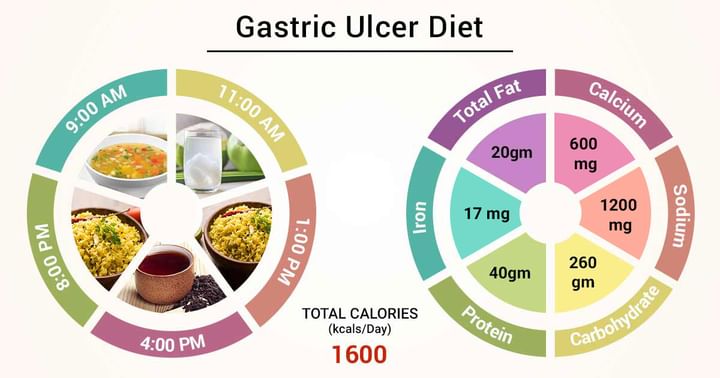Diet Chart For Gastric ulcer
Last Updated: Jan 20, 2025
About
An ulcer in the stomach is known as a gastric ulcer while that in the first part of the intestines is known as a duodenal ulcer. The most common symptoms of a duodenal ulcer are waking at night with upper abdominal pain or upper abdominal pain that improves with eating. With a gastric ulcer the pain may worsen with eating. The pain is often described as a burning or dull ache. Other symptoms include belching, vomiting, weight loss, or poor appetite. About a third of older people have no symptoms. Complications may include bleeding, perforation and blockage of the stomach. Bleeding occurs in as many as 15% of people.
Common causes include the bacteria Helicobacter pylori and non-steroidal anti-inflammatory drugs (NSAIDs). Other less common causes include tobacco smoking, stress due to serious illness, Behcet disease, Zollinger-Ellison syndrome, Crohn disease and liver cirrhosis, among others. Older people are more sensitive to the ulcer-causing effects of NSAIDs. The diagnosis is typically suspected due to the presenting symptoms with confirmation by either endoscopy or barium swallow. H. pylori can be diagnosed by testing the blood for antibodies, a urea breath test, testing the stool for signs of the bacteria, or a biopsy of the stomach. Other conditions that produce similar symptoms include stomach cancer, coronary heart disease, and inflammation of the stomach lining or gallbladder inflammation.
Diet does not play an important role in either causing or preventing ulcers.[9] Treatment includes stopping smoking, stopping NSAIDs, stopping alcohol and giving medications to decrease stomach acid. The medication used to decrease acid is usually either a proton pump inhibitor (PPI) or an H2 blocker with four weeks of treatment initially recommended. Ulcers due to H. pylori are treated with a combination of medications such as amoxicillin, clarithromycin and a PPI. Antibiotic resistance is increasing and thus treatment may not always be effective. Bleeding ulcers may be treated by endoscopy, with open surgery typically only used in cases in which it is not successful.
Diet Chart
| Sunday | |
| Breakfast (8:00-8:30AM) | Vegetable soup (1 cup) |
| Mid-Meal (11:00-11:30AM) | Tender coconut water (1 cup) + 1 Apple (Unskinned) |
| Lunch (2:00-2:30PM) | Khichdi (1/2 cup) |
| Evening (4:00-4:30PM) | Boiled Black grams (1/3rd cup) + Black Tea (1 cup) |
| Dinner (8:00-8:30PM) | Khichdi (1/2 cup) |
| Monday | |
| Breakfast (8:00-8:30AM) | Boiled White Chickpeas n Tomato (1 cup) |
| Mid-Meal (11:00-11:30AM) | Tender coconut water (1 cup) + Grapes (1/2 cup) |
| Lunch (2:00-2:30PM) | Chapati (2) + Fish(1pc.) stew |
| Evening (4:00-4:30PM) | Roasted Rice Flakes (1/2 cup) + Black Tea (1 cup) |
| Dinner (8:00-8:30PM) | Boiled Rice (1/2 cup) + Baked Pumpkin (1/3rd cup) |
| Tuesday | |
| Breakfast (8:00-8:30AM) | Carrot soup (1 cup) |
| Mid-Meal (11:00-11:30AM) | Tender coconut water (1 cup) + Pomegranates (1/2 cup) |
| Lunch (2:00-2:30PM) | Boiled rice (1/2 cup) + Cabbage curry (1/3rd cup) |
| Evening (4:00-4:30PM) | Boiled Potato n Black grams (1/2 cup) + Black Tea (1 cup) |
| Dinner (8:00-8:30PM) | Boiled Rice (1/2 cup) + Mashed potato(2) + 1tsp Ghee |
| Wednesday | |
| Breakfast (8:00-8:30AM) | Vegetable soup (1 cup) |
| Mid-Meal (11:00-11:30AM) | Tender coconut water (1 cup) + 1 Guava |
| Lunch (2:00-2:30PM) | Carrot Uttappam (1) + Raita (1/3rd cup) |
| Evening (4:00-4:30PM) | Puffed Rice (1/2 cup) + Black Tea (1 cup) |
| Dinner (8:00-8:30PM) | Khichdi (1/2 cup) |
| Thursday | |
| Breakfast (8:00-8:30AM) | Baked Tomato n Brolli wity bell peper soup (1 cup) |
| Mid-Meal (11:00-11:30AM) | Tender coconut water (1 cup) + Ripe Papaya (1/3rd cup) |
| Lunch (2:00-2:30PM) | Chapati (2) + Baked vegetables (1/2 cup) + Raita (1/3rd cup) |
| Evening (4:00-4:30PM) | Boiled Black grams (1/3rd cup) + Black Tea (1 cup) |
| Dinner (8:00-8:30PM) | Boiled Rice (1/2 cup) + Bottle gourd curry (1/3rd cup) |
| Friday | |
| Breakfast (8:00-8:30AM) | Broccoli n Bell peper soup (1 cup) |
| Mid-Meal (11:00-11:30AM) | Tender coconut water (1 cup) + 1 Orange |
| Lunch (2:00-2:30PM) | Boiled Rice (1/2 cup) + Lentil soup (1/2 cup) |
| Evening (4:00-4:30PM) | Roasted Rice Flakes (1/2 cup) + Black Tea (1 cup) |
| Dinner (8:00-8:30PM) | Boiled Rice (1/2 cup) + Fish(1pc.) stew (1/3rd cup) |
| Saturday | |
| Breakfast (8:00-8:30AM) | Carrot n Beetroot soup (1 cup) |
| Mid-Meal (11:00-11:30AM) | Tender coconut water (1 cup) + 2 Chikus |
| Lunch (2:00-2:30PM) | Dosa (1) + Samber (1/2 cup) |
| Evening (4:00-4:30PM) | Boiled Potato n Black grams (1/2 cup) + Black Tea (1 cup) |
| Dinner (8:00-8:30PM) | Boiled Rice (1/2 cup) + Pointed gourd(without seeds n Unskinned) Curryurry |
Do's And Dont's
Do's:
- Being overworked and overstressed are like extending a direct invitation to gastric problems. The body loses its ability to perform normal digestive functions and is often associated with increased production of stomach acids. Having 5 small easily digestible meals a day at proper intervals is a key to good digestive health. Eating slowly without talking and chewing the food properly also improves digestion. It reduces intestinal gas as less air is swallowed during the eating process. Emotional eating too causes such disorders. So it is very important to fix any so called underlying reasons, be it psychological or emotional to make a complete recovery from the said condition.
- Any physical activity which helps you break into a sweat improves the process of metabolism and assimilation in the body. Breathing exercises and yoga can bring relief from bloating, flatulence and other symptoms of indigestion and intestinal gas.
- A prerequisite in order to achieve a healthy digestive process is an efficiently hydrated body. Drinking 8-10 glasses of water every day is mandatory to prevent any gastric complications. Drinking 2-3 glasses of luke warm water first thing in the morning is said to help with regular bowel movements and relieve indigestion and flatulence.
- There are a lot of food items which go a long way in maintaining a healthy digestive tract. Probiotics are the friendly bacteria of the gut. They help in breaking down the food and making it easy for the body to digest it. Fermented milk products like yogurt contain the bacteria lactobacillus which is known to promote digestion.
- Non glutenous grains, non citric fruits and vegetables, high fiber and lean protein meats are the best choices.
- One of the best known herbs to treat gastritis is ginger. It heals the gastric lining and reduces inflammation. It reduces vomiting tendencies and is known for its anti microbial prowess.
Don'ts:
- Avoiding foods like complex carbohydrate and proteins (difficult to be broken down) following a gastric attack would be a good idea.
- Avoiding alcohol and smoking is absolutely essential to recover from a gastric attack. Prolonged intake of these could cause irrepairable damage to the gut.
- Staying away from certain medications like acetaminophens, analgesics, ibuprofen, non steroidal anti inflammatory drugs is important in preventing gastritis. It is essential to ask one’s physician as to which other medications one could opt for in the given condition.
- Caffeinated beverages like sodas, tea and coffee should be in taken in a controlled portion.
- Keeping away from wheat, tomatoes, lemons, red meat etc is essential. Staying away from dairy is also recommended in gastritis. Anything hot and spicy like peppers, black pepper or red chili powder should be kept away from. These have a history of causing irritation in the gastric lining. Vegetables like cabbage, broccoli, brussel sprouts, beans are tougher on the gut and should be stayed away from.
Food Items You Can Easily Consume
- Cereals & Pulses: Whole grain cereals (rice, oats, jowar, bajra and ragi) and pulses (red gram, green gram, bengal gram and black gram dals).
- Fruits & vegetables: Fruits (stewed apple, banana, papaya, pomegranate, pear, melons (water melon, musk melon) and vegetables (all gourds, ladies finger, tinda, green leafy vegetables (indian spinach, fenugreek leaves, corriander leaves, radish leaves, drumstick leaves, pumpkin leaves).
- Meat, Fish & Poultry: Lean meat, skin less chicken, fish (mackerel, trout, sardine, salmon, tuna).
- Milk & Milk products: Yoghurt, other fermented milk products.
- Nuts & Oils: Almonds, walnuts, pista, olive oil, mustard oil, vegetable oil.
References
- Kato I, Nomura AM, Stemmermann GN, Chyou PH. A prospective study of gastric and duodenal ulcer and its relation to smoking, alcohol, and diet. American journal of epidemiology. 1992 Mar 1;135(5):521-30.
- Sonnenberg AM. Dietary salt and gastric ulcer. Gut. 1986 Oct 1;27(10):1138-42.
- Rydning A, Weberg R, Lange Q, Berstad A. Healing of benign gastric ulcer with low-dose antacids and fiber diet. Gastroenterology. 1986 Jul 1;91(1):56-61.
Table of content
Find Dietitian/Nutritionist near me
Ask a free question
Get FREE multiple opinions from Doctors



